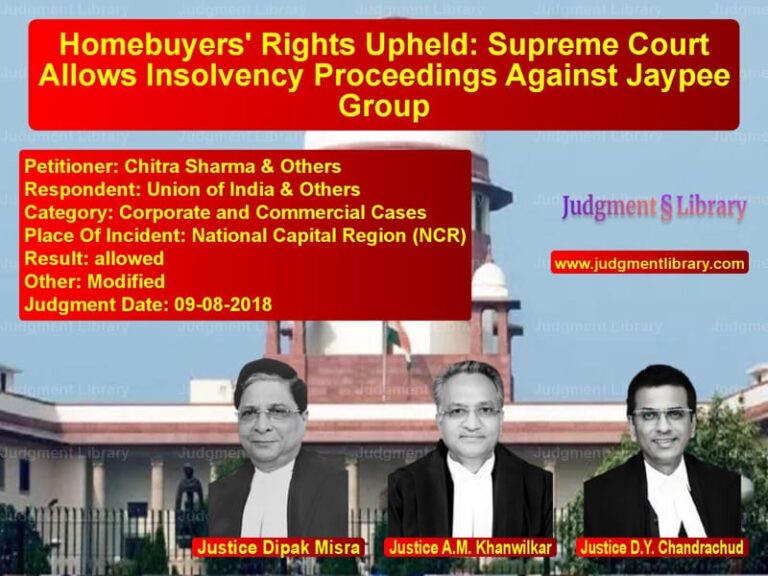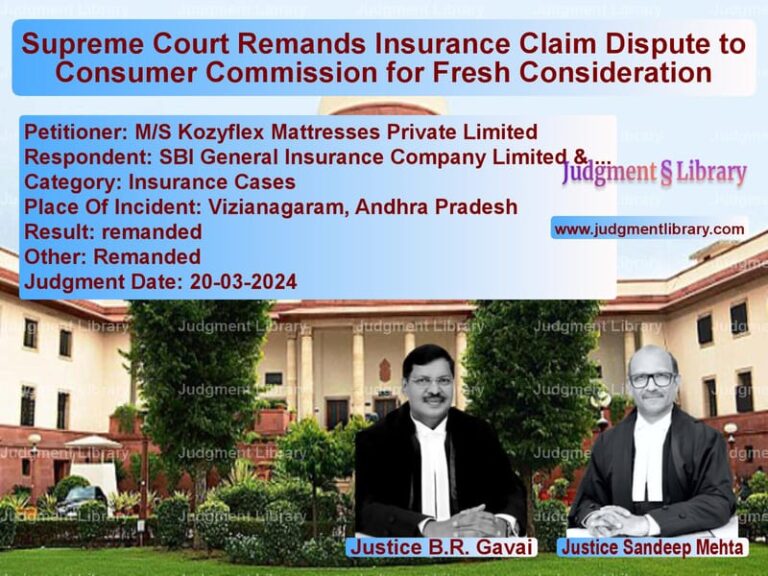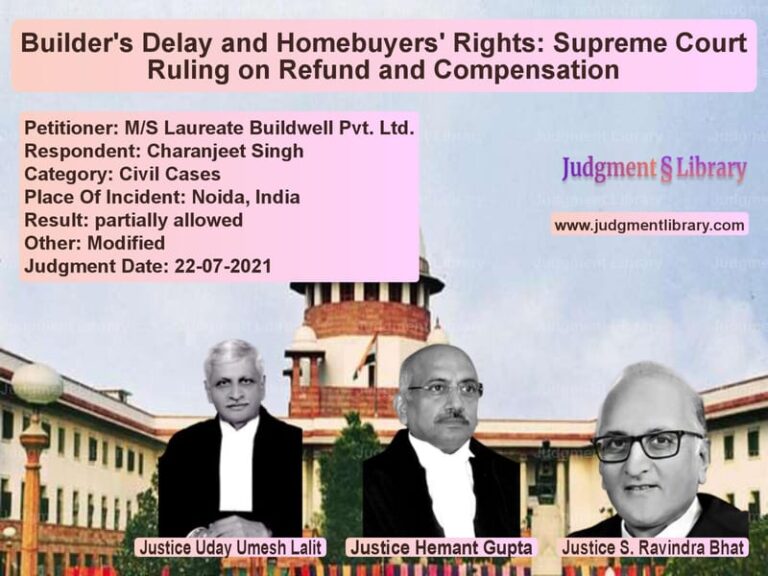Supreme Court Upholds Disbarment of Advocate for Professional Misconduct
The Supreme Court of India recently ruled in M/s. Advanta India Ltd. vs. B.N. Shivanna, addressing the professional misconduct of an advocate who allegedly defrauded his client by forging documents and fabricating court orders. The case revolved around a complaint filed against advocate B.N. Shivanna by M/s. Advanta India Ltd., which led to his disbarment by the Karnataka State Bar Council. The Bar Council of India (BCI) initially reduced the punishment to an 18-month suspension, but the Supreme Court overturned this decision and reinstated the original penalty.
Background of the Case
The appellant, M/s. Advanta India Ltd., is engaged in the research, production, and distribution of hybrid seeds. The respondent, B.N. Shivanna, initially joined the company as a Marketing Executive in 1998 but later took on the role of its legal counsel. The allegations against him stem from his handling of legal matters on behalf of the company.
According to the appellant, Shivanna devised a scheme to defraud the company by fabricating legal proceedings and extracting money under false pretenses. The case came to light when a police constable visited the company’s office in September 2000, claiming to have arrest warrants for the company’s top executives. Shivanna convinced the management that numerous farmers had filed complaints against them and that immediate legal action was necessary to prevent arrests.
Petitioner’s Allegations
M/s. Advanta India Ltd. alleged that:
- Shivanna falsely claimed that the company needed to file 631 criminal petitions to quash farmer complaints.
- He demanded a court fee of Rs. 10,000 per petition, amounting to a total of Rs. 62,51,259.
- The advocate introduced a person named Ms. Gowri as a stamp vendor and issued a fake receipt for the court fees.
- Shivanna also urged the company to retain three other legal professionals, whom he introduced, at an additional cost of Rs. 6,46,500.
- Further, the respondent charged the company Rs. 2,12,500 as his legal fees, bringing the total amount to Rs. 72,00,000.
Discovery of the Fraud
The company eventually became suspicious of Shivanna’s conduct when it received repeated threats from the police despite supposedly filing multiple criminal petitions. They sought advice from a different lawyer, B.K. Sampath Kumar, who investigated the matter and discovered that:
- No such criminal petitions had been filed.
- No court fees were required for the alleged legal actions.
- The receipt for the court fees was fake, and Ms. Gowri was not a registered stamp vendor.
- The High Court order that Shivanna had presented as proof of the petitions’ success was a forgery.
The matter was then reported to the Karnataka State Bar Council, which initiated disciplinary proceedings against Shivanna.
Disciplinary Actions
The Karnataka State Bar Council’s Disciplinary Committee found Shivanna guilty of professional misconduct and, on July 31, 2005, passed an order debarring him from legal practice for life and removing his name from the rolls of the Bar Council.
Shivanna appealed this decision before the Bar Council of India (BCI). The BCI, in its order dated September 10, 2011, upheld the finding of guilt but reduced the punishment to an 18-month suspension along with a fine of Rs. 25,000.
Supreme Court’s Judgment
Review Power of the Bar Council
Shivanna later filed a review petition under Section 48AA of the Advocates Act, 1961, which the BCI allowed on July 11, 2015. The review order set aside the previous decision and directed fresh consideration of the case. M/s. Advanta India Ltd. then challenged the review order before the Supreme Court.
The Supreme Court examined whether the BCI had exceeded its review jurisdiction. The Court ruled:
“The power of review does not extend to reassessing findings already determined in an appeal unless there is a manifest error. The BCI’s review order was a clear overreach.”
Denial of Cross-Examination Rights
The Supreme Court also reviewed Shivanna’s claim that he was denied the opportunity to cross-examine the complainant. The Court noted:
“The respondent intentionally delayed the proceedings multiple times, producing medical certificates to avoid cross-examining the complainant. The Disciplinary Committee rightfully proceeded despite his absence.”
Forgery and Professional Misconduct
The Court observed that Shivanna had not only defrauded his client but had also forged court documents and misrepresented legal proceedings. The judgment stated:
“A lawyer’s duty is to uphold justice, not to deceive clients. The respondent’s misconduct tarnishes the legal profession’s integrity.”
Final Ruling
The Supreme Court set aside the BCI’s review order and reinstated the original punishment of lifelong debarment. The Court ruled:
“The appeal is allowed. The BCI’s order of July 11, 2015, is set aside, and its earlier order of September 10, 2011, stands revived. However, the appellant is free to seek further enhancements of punishment.”
Key Takeaways from the Judgment
- BCI’s Review Power is Limited: The ruling clarifies that the BCI cannot reassess findings in appeal unless there is a manifest error.
- Forgery and Fraud Lead to Disbarment: The Court reinforced that lawyers engaged in fraud will face severe consequences, including permanent removal from the profession.
- Delay Tactics Will Not Be Tolerated: The judgment upholds disciplinary committees’ right to proceed if an advocate uses procedural delays to obstruct justice.
- Client Protection Strengthened: The case sets a precedent to ensure clients are safeguarded against dishonest legal practitioners.
Conclusion
The Supreme Court’s ruling in M/s. Advanta India Ltd. vs. B.N. Shivanna sets a crucial precedent for professional misconduct cases in the legal fraternity. By upholding the strictest penalty for fraudulent legal practices, the Court has reinforced the necessity for ethical conduct among advocates. The decision ensures that the legal profession remains a bastion of trust and integrity, protecting clients from deception and malpractice.
Petitioner Name: M/s. Advanta India Ltd.Respondent Name: B.N. ShivannaJudgment By: Justice A.K. Sikri, Justice Ashok BhushanJudgment Date: 21-02-2018
Don’t miss out on the full details! Download the complete judgment in PDF format below and gain valuable insights instantly!
Download Judgment: Ms. Advanta India L vs B.N. Shivanna Supreme Court of India Judgment Dated 21-02-2018.pdf
Direct Downlaod Judgment: Direct downlaod this Judgment
See all petitions in Legal Malpractice
See all petitions in Employment Disputes
See all petitions in Disciplinary Proceedings
See all petitions in Judgment by A.K. Sikri
See all petitions in Judgment by Ashok Bhushan
See all petitions in allowed
See all petitions in supreme court of India judgments February 2018
See all petitions in 2018 judgments
See all posts in Service Matters Category
See all allowed petitions in Service Matters Category
See all Dismissed petitions in Service Matters Category
See all partially allowed petitions in Service Matters Category







